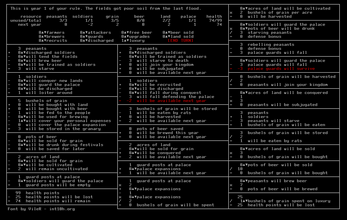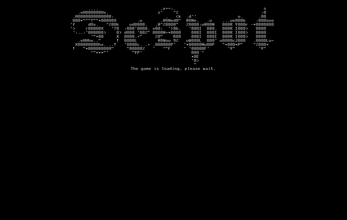Despot
Become a king in ancient Mesopotamia: expand your kingdom and make it prosper, or just enjoy a luxurious lifestyle while your peasants starve to death. Will the rage of your suffering subjects consume you? Will your health fail you sooner? Whatever fate awaits you, cling to your throne as long as you can!
Inspired by Hamurabi, Despot features revamped mechanics and a layout that resembles Sumerian clay tablets.
Beware, the game is challenging; it was specifically designed to exploit some assumptions a player would likely make. If you are stuck, this playthrough video might give you some ideas.
Rules
You are the king of a tiny kingdom in ancient Mesopotamia, with the goal to rule as long as you can.
There are seven resources:
- Peasants give you labor capacity. The results of their work are received the following year.
- A peasant can cultivate 1 acre of land.
- A peasant can brew 7 pots of beer from 1 bushel of grain.
- A peasant can be trained as a soldier.
- Soldiers can be assigned to military tasks, or discharged to instantly convert them to peasants.
- A soldier can conquer 1 acre of land, at the cost of his life. The first acre you annex in a given turn is empty, but each additional acre comes with 3 peasants.
- A soldier can be assigned to guard the palace from rebels.
- Grain has numerous uses, but rats eat half of the grain left in storage.
- Each person eats 1 bushel of grain. (Jobless peasants don't get to eat.)
- Brewers need an additional bushel of grain as raw material.
- You use grain to cover your personal expenses, which is inversely proportional to the health you lose.
- Upgrading your palace by 1 level costs its current level in grain.
- Beer can improve morale, making the rebels less determined (or drunk), giving an edge to your palace guards for that year.
- The defense bonus conferred by each pot of beer given away = number of guards / number of starving peasants.
- You can instantly sell 10 pots of beer for 1 bushel of grain.
- Land can be cultivated or sold.
- You can harvest 1-6 bushels of grain per acre, depending on the soil the last flood brought. This also attracts new peasants to your kingdom (1 peasant per 2 bushels).
- You can instantly sell an acre of land for 3 bushels of grain.
- The palace level is the maximum number of soldiers you can assign as palace guard. Upgrades take effect the following year.
- Health is required to stay on the throne.
Rebellion mechanics:
- Every starving peasant rebels.
- The total number of rebels that the palace guards kill without taking casualty equals the defense bonus.
- Any remaining rebels kill 1 guard each, dying in the process.
- If less than 0 guards are left, you lose.
Notes
The game won't let you proceed if your plans were to cause your downfall. Eventually, you will have no choice but to restart the game.
The Toshiba Satellite font is from VileR's font pack.
Fun fact: the display is a single character matrix that you can select and copy (even though there is no visual feedback from making the selection).
Feel free to share in the comments how you fared against a specific seed!
| Status | Released |
| Platforms | HTML5 |
| Rating | Rated 3.5 out of 5 stars (2 total ratings) |
| Author | Undestroyed |
| Genre | Strategy |
| Tags | ascii, DOS, Minimalist, Retro, Singleplayer, Text based, Turn-based Strategy |
| Average session | About a half-hour |
| Languages | English |
| Inputs | Mouse |
Development log
- Recent updates and the futureNov 15, 2020


Comments
Log in with itch.io to leave a comment.
This game is truly _extremely_ difficult without a lot of luck starting a good random seed. Out of about 15 tries, I only proceeded beyond two years once, and that was only to year four. In truth, I would not label it as "challenging", but as "utterly frustrating and hostile towards anyone playing it".
The starting situation is difficult to begin with, and the "exploit some assumptions a player would likely make" only compounds it, creating a game that is, to be blunt, openly player hostile.
Almost every time, I have to sell one land to get grain, leaving me only one land to sow. Rebellious peasants constantly require me to maintain palace guards, which die defending. Then I have to recruit more guards from the peasants, limiting how much I can assign them to sowing land and other tasks. Likewise, I am not able to assign soldiers to capture new lands to grow. In turn, this limits grain production, starving peasants and guards, seemingly making them more rebellious. Rinse, repeat, end of game
I would suggest if the design is ot exploit "assumptions made", a least state what those are. As it is, the game comes off as "I designed this game so you will lose, therefore, you lose, game over!"
Thank you for the feedback!
“Out of about 15 tries, I only proceeded beyond two years once” This is definitely not the experience we had during playtests. Either you were struck by extreme bad luck, or you haven’t got the hang of it yet. In the playthrough video, I survive 10 years with the seed lezchnt3x2a, which is somewhat lucky, so you might want to try it. (And you can compare decisions if you still run into difficulties.)
I haven’t specified the assumptions being exploited because that could act as a spoiler. (They concern the strategy, there is no hidden/misleading rule.)
The goal is to rule as long as you can, and you can’t do it indefinitely, so in this sense, the player is indeed destined to lose. :)
Edit: I’ve managed to survive 6 years without tending the fields at all, which means it is possible to survive 6 years with any random seed. (Of course, one can achieve better results with farming.)
Great!! What engine did you use to make this?
Thanks! It’s just JavaScript with jQuery.
I don't know if it's me or the game but I always get stuck on year 2 and it seems as I can't progress...
It depends on the random seed, but it’s usually possible to survive 6-9 years. (Maybe I should post some play-through at some point.)
Edit: What was the bottleneck? If you are short on grain, try selling some land. Also make sure the palace is well-defended if there are any hungry peasants.
very clear and simple interface. i like that the affected options are highlighted when hovering, this really helps to focus and make the “right” choices.